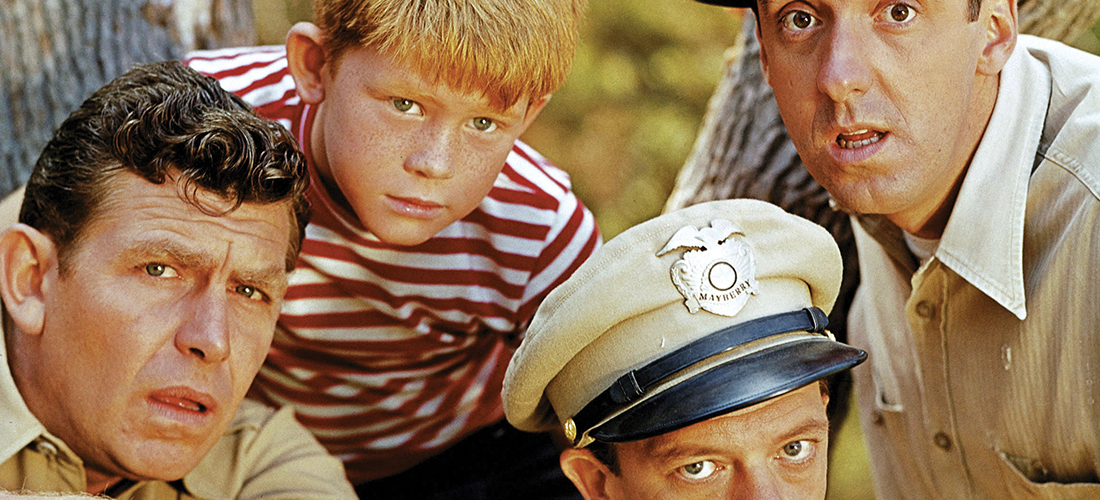
Ted Talk
A few serious words about humor
By Maria Johnson
To: Ted Koppel
From: Me
Re: Stay in your lane
Dear Mr. Koppel:
“How do you do, Mrs. Wile-y?”
Do these words mean anything to you?
Didn’t think so.
I’ll explain them later.
As you might have guessed by now, I’m writing to you about your piece for CBS News Sunday Morning, the one you reported from the city of Mount Airy, N.C., which was the hometown of Andy Griffith and the inspiration for Mayberry, the fictional setting of the The Andy Griffith Show.
Some people have called your story a hit piece on the show.
I don’t think it was a hit piece.
’Cause I think you missed the point entirely.
But first, I’ll give you kudos you deserve. You’re awesome at crises. Really. When Iranian militants took 52 American hostages in 1979, you rightly dogged that story every night for 302 of the 444 days they were in captivity. Your show, Nightline, ushered in an era of 24/7 news channels.
So, um . . . thank you?
Also, a few years ago, you wrote a helluva book, which warned about the vulnerability of U.S. power grids to other countries. You did this country a service in writing the book. In fact, I stood in line so you could autograph my copy after your Bryan Series lecture here in 2018.
I gotta hand it to you. You’re a newshound’s newshound, with a deep understanding of foreign actors.
But your understanding of comic actors?
Bro.
Stay home.
In your piece for Sunday Morning, you made an airtight case that Mayberry was an idealized place, a fantasy island that failed to recognize political and racial tensions in the years the series was shot, 1960–’68.
Very true.
In fact, the spirit of the series was rooted even farther back in time — in the 1930s and ’40s.
How do I know this?
Opie told me.
Ron Howard, the actor who played Opie Taylor on the show — and who has gone on to become one of Hollywood’s most respected directors — recently teamed up with his brother, Clint, to tell the story of their growing up in Hollywood.
The book is called The Boys, and, as you might expect, it spills a decent amount of ink on The Andy Griffith Show, which launched little red-headed Ronny to stardom.
As adult Ron tells it, Griffith, who died in 2012, was at the height of his power when he created the show that bore his name.
He was coming off a successful radio career — “What It Was Was Football”— and a stint on Broadway. He’d just scored a major hit film, A Face in the Crowd, in which he played Lonesome Rhodes, a two-bit radio host who gains a following and “transforms into a lusty, egomaniacal demagogue.”
Interesting, huh?
“Elia Kazan was a brilliant director,” Howard writes. “But he had manipulated and provoked Andy to summon his darkest, ugliest thoughts and impulses, and the process about wrecked him. ‘I don’t ever want to do that again,’ Andy said. ‘I like to laugh when I’m working.’”
Howard continues.
“Andy, born in 1926, consciously set out to evoke the atmosphere of his youth in the 1930s and ’40s. People are nostalgic for The Andy Griffith Show now, but it’s important to realize that, even then, it was an evocation of a bygone era, and an idealized evocation at that.”
Still, Griffith showed that he felt the pinch of discrimination — in maybe the only way that he, a handsome, successful white man, could have. He was eager to dispel the myth that all Southerners are stupid hayseeds.
“One of his major motivations for the sitcom was to portray his world with humanity and depth,” Howard writes.
And Griffith did so, brilliantly, using humor.
Against the backdrop of innocence, Mayberry’s stories unfold, time after time, with fools and their foibles.
No character is spared.
Sheriff Andy Taylor himself falls short in several episodes.
Because the stories are made up — and the writers could make them end with fairy tale precision — compassion and understanding always prevail.
Humility is usually the lesson.
Laughing at our own shortcomings, as acted out by others, delivers the goods.
Which brings us to a character named Ernest T. Bass.
If he existed today — which he does, in many forms — he might be called developmentally challenged. He’s rude and crude, and he throws rocks through windows to get attention.
In one episode, “My Fair Ernest T. Bass,” a riff on My Fair Lady, Sheriff Taylor and his bumbling sidekick, Deputy Barney Fife — one of the funniest TV characters of all time — try to remake Bass into a well-dressed, well-spoken gentleman so he might snare a girlfriend at a society function.
Are they condescending to presume that they could, or should, change Ernest T.? You bet.
But they press on. They coach him on how to greet his hostess properly — “How do you do, Mrs. Wiley?” Ernest T. labors mightily to learn the greeting and a few other pleasantries. At the party, he struggles to make his well-rehearsed lines fit mismatched moments.
And we laugh. Because we feel the prickly heat of his discomfort. Because who among us hasn’t been caught flat-footed?
The episode has a happy ending, of course. At the party, Ernest T. finds another sow’s ear pretending to be a silk purse — a woman who’s just as unpolished as he is — and they literally leapfrog into the sunset together.
Who’s the fool here?
I dare say anyone who watches the reruns could tell you, regardless of their political party. You made a serious misstep, Ted, in bringing presidential politics into your Sunday Morning piece.
Here’s my best Mayberry-esque arm-round-your-shoulder advice: Stick to hostages and power outages.
And leave us Mayberry fans alone, on our couches, with the laughter that takes us to places a news story can’t.
Best Always,
MJ OH
Maria Johnson is a contributing editor of O.Henry. Email her at
ohenrymaria@gmail.com. By Maria Johnson





